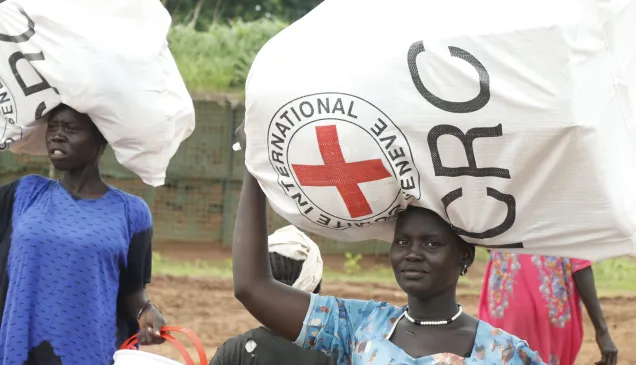Twenty-first session of the Conference of the States Parties to the Chemical Weapons Convention, 2016, The Hague, Netherlands. Statement by the ICRC.
We strongly condemn any use of chemical weapons, by any party, anywhere. We are deeply alarmed by the allegations of continuing use during 2016.
The Chemical Weapons Convention (CWC) is one of the most successful international agreements. With 192 States Parties having committed to eliminating chemical weapons and preventing any return to chemical warfare, the Convention has achieved near-universal status.
Now, more than ever, the States Parties must push for universalization, since there can be no justification for remaining outside this Convention. The ICRC joins calls for the remaining five States – the Democratic People's Republic of Korea, Israel, Egypt, Palestine and South Sudan – to ratify or accede to it without delay.
The Convention's comprehensive prohibition of an entire class of weapons is firmly rooted in the age-old taboo against the use of poison as a means of warfare. Today, the prohibition of the use of chemical weapons – enshrined in the 1925 Geneva Protocol and the CWC – is a rule of customary international humanitarian law. It is binding on all parties to all armed conflicts, be they States or non-State armed groups. The ban is absolute and far-reaching, covering both improvised and classical chemical weapons.
But although the norm against the use of chemical weapons is universal and binds all parties to all armed conflicts, the strength of the norm has been put to the test by recent events. It is the duty of all the States party to the CWC to uphold and ensure universal respect for the prohibition.
The ICRC has been shocked by the repeated use of chemical weapons over the past four years in Syria, confirmed by the findings of the Organisation for the Prohibition of Chemical Weapons (OPCW) and United Nations investigations, including the Joint Investigative Mechanism. We strongly condemn any use of chemical weapons, by any party, anywhere. We are deeply alarmed by the allegations of continuing use during 2016. These inhumane means of waging war are absolutely prohibited, and any such use constitutes a serious violation of international humanitarian law.
Preventing any further use of chemical weapons must be the overriding priority of all the States Parties, and the ICRC welcomes the decision of the OPCW Executive Council of 11 November 2016 condemning the use of chemical weapons, calling on all parties to desist from further use, and asserting that those responsible would be held accountable. The ICRC again appeals on all parties to the armed conflicts in Syria, Iraq and elsewhere, in the name of humanity, to respect the prohibition.
The ICRC commends the continued efforts of States, the OPCW and the UN to eliminate chemical weapon stockpiles, investigate allegations of use and attribute responsibility.
With a view to preventing any further weakening of the norm against the use of chemical weapons, the ICRC would also like to reiterate another issue, namely its position and call to States regarding the development and use of highly toxic chemicals as weapons for law enforcement – so-called "incapacitating chemical agents" or "central nervous system-acting chemicals".
The OPCW Scientific Advisory Board's April 2016 report recalled that technical discussions on this issue have been exhaustive. And indeed, this is not a technical issue, but a matter of policy and law, and of humanitarian concern, which goes to the heart of the prohibition of chemical weapons.
The position of the ICRC since February 2013 has been that the use of toxic chemicals as weapons for law enforcement purposes should be limited to riot control agents only. It appealed to States to, firstly, confirm a national policy to this effect; and, secondly, begin collective discussions to clarify this issue among all States.
The ICRC welcomes the view expressed by a group of 35 States in a joint paper submitted to this Conference, entitled "Aerosolisation of Central Nervous System-Acting Chemicals for Law Enforcement Purposes", that international discussions within the OPCW's policy-making organs are required to address the serious risks this poses to the CWC.
The ICRC urges States, collectively, to heed this call, and at the same time it continues to call on each individual State to join those that have already confirmed a national policy and legislation that restricts the use of toxic chemicals as weapons for law enforcement purposes to riot control agents only.
This reflects the overwhelming practice of all States since the CWC entered into force, and reinforces the object and purpose of the treaty.
In closing, the ICRC appeals to the States Parties to be steadfast in their commitment to eliminating chemical weapons, stopping any further use, and preventing their re-emergence.



